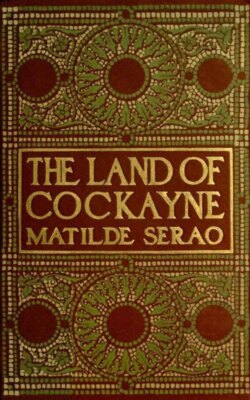The Land of Cockayne

Реклама. ООО «ЛитРес», ИНН: 7719571260.
Оглавление
Matilde Serao. The Land of Cockayne
CHAPTER I – THE LOTTERY DRAWING
CHAPTER II – AGNESINA FRAGALÀ'S CHRISTENING
CHAPTER III – IN THE CAVALCANTIS' HOUSE
CHAPTER IV – DR. AMATI
CHAPTER V – CARNIVAL AT NAPLES
CHAPTER VI – DONNA CATERINA AND DONNA CONCETTA
CHAPTER VII – DON GENNARO PARASCANDOLO'S BUSINESS
CHAPTER VIII – IN DON CRESCENZIO'S LOTTERY-SHOP
CHAPTER IX – BIANCA MARIA'S VISION
CHAPTER X – MAY AND SAN GENNARO'S MIRACLE
CHAPTER XI – AN IDYLL AND MADNESS
CHAPTER XII – THE THREE SISTERS—CHIARASTELLA THE WITCH
CHAPTER XIII – THE CONFECTIONER'S SHOP BANKRUPT
CHAPTER XIV – THE MEDIUM'S IMPRISONMENT
CHAPTER XV – SACRILEGE—LOVE'S DREAM FLED
CHAPTER XVI – PASQUALINO DE FEO'S WILL
CHAPTER XVII – BARBASSONE'S INN—THE DUEL
CHAPTER XVIII – TO LET
CHAPTER XIX – DON CRESCENZIO'S TRIALS
CHAPTER XX – BIANCA MARIA CAVALCANTI
Отрывок из книги
The afternoon sun crept into the Piazzetta dei Banchi Nuovi, broadening from Cardone's, the engraver, to Cappa's, the chemist, lengthening on from there up the whole Santa Chiara Road, spreading a light of unusual gaiety over the street, which always wears, even in its most frequented hours, a frigid, claustral aspect. But the great morning traffic, of people coming from the northern districts of the town—Avvocata, Stella, San Carlo all' Arena, San Lorenzo—to go down to the lower quarters of Porto, Pendino and Mercato, or vice versâ, had been slowly slackening since mid-day; the coming and going of carts, carriages and pedlars had ceased; everybody seemed to be taking short cuts by the Chiostro di Santa Chiara and the Vico 1o Foglia towards Mezzocannone Alley, the Gesù Nuovo, San Giovanni Maggiore. Presently the sun's brightness lit up a street by then quite deserted. The shopkeepers on the right side of Santa Chiara—as the left side is only the high, dark enclosure wall of the Poor Clares' Convent—dealers in old dusty or wretched mean new furniture, coloured engravings, shiny oleographs, wooden and stucco saints, were at the back of their dark shops, eating over a corner of wine-stained tablecloth, with a caraffe of Marano small wine, closed by a twisted vine-leaf, standing by a big dish of macaroni. The porters, seated on the ground at the shop entrance, were eating lazily at a small loaf of bread, cut in two to hold some tasty viand—fried gourd soaked in vinegar, parsnips in green sauce, pomegranates seasoned with vinegar, garlic and pepper. The sharp, greasy smell of the quantity of tomatoes all this macaroni was cooked in, from one end of the street to the other, mingled with the acute odour of sour vinegar and coarse spices. From some passing fruitseller, carrying a nearly empty basket of figs on his head, or pushing a barrow with purple plums, and tough spotted peaches at the bottom of the baskets, the shopkeepers, clerks and porters, lips still red from tomatoes or shining with grease, bargained for a penny-worth of fruit, to finish their meal; two workmen, in front of the Martello printing-shop, where the small visiting-card press had stopped, deeply coveted a yellow melon; and two seamstresses were waiting on a doorstep chattering, till the seller of pizza passed, which is the shredded rind of tomato, garlic, and wild marjoram, cooked in the oven, and sold at a farthing, a half-penny, a penny, the piece. The pizzaiuolo did pass, in fact, but he was carrying his wooden tray, shining with oil, under his arm, without a bit of pizza; he had sold everything, and was going off to eat his own meal, down to the Porto quarter, where his shop was. The two disappointed seamstresses consulted each other; one of them, a blonde, with a golden aureole round her pale gentle face, moved off with that undulating step that gives an Oriental touch to a Neapolitan woman's charm. She went up Santa Chiara Road, bending her head so as not to get the sun in her face, and went into Impresa Lane, towards the wine-seller's dark shop—which was a drinking-shop, too—almost opposite the Impresa Palace; she was going to buy something to eat for her friend and herself. The Impresa Lane had got empty, too, after mid-day, when all go back to their houses and shops to eat, as the summer heat gets greater, and the controra—the time of the Neapolitan day that corresponds to the Spanish siesta—begins with food, rest and sleep for tired folk. The dressmaker, a little frightened by the darkness of the cellar, out of which came a sour smell of wine, had stopped on the threshold; blinking, she looked on the ground before going in, feeling that an open underground cave, with a black gaping mouth, was dangerous. But the shop-boy came towards her to serve her.
'Give me something to eat with my bread,' she said, swaying herself a little.
.....
'You will not have seen him,' Annarella repeated, obstinate in her sad incredulity. 'How could he not come? He comes here every Saturday. He might not be at home with his little ones; he might not be at the glove factory, where he can earn bread; but he can't be anywhere else than here on Saturday to hear the numbers come out: here is his ruling passion and his death.'
'He plays a lot, doesn't he?' said Carmela, who had grown pale and had tears in her eyes.
.....